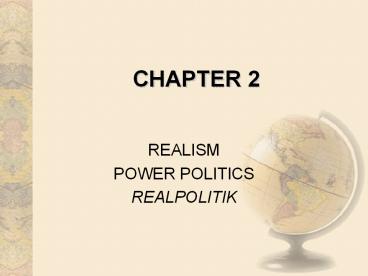REALISM - PowerPoint PPT Presentation
1 / 24
Title:
REALISM
Description:
CHAPTER 2 REALISM POWER POLITICS REALPOLITIK Long Tradition of Political Realism Thucydides, History of the Peloponnesian War Sun Tsu (or Sun Zi), Art of War Niccolo ... – PowerPoint PPT presentation
Number of Views:159
Avg rating:3.0/5.0
Title: REALISM
1
CHAPTER 2
- REALISM
- POWER POLITICS
- REALPOLITIK
2
Long Tradition of Political Realism
- Thucydides, History of the Peloponnesian War
- Sun Tsu (or Sun Zi), Art of War
- Niccolo Machiavelli, The Prince
- Thomas Hobbes, The Leviathan
- Karl Von Clausewitz, On War
- Long a major theoretical approach of scholars
- Even more prevalent as guide to action for
policymakers (even if implicit) - Contest between realism and idealism/liberalism
in first half of 20th century, realism dominant
in second half
3
Central Tenets of Realism the Realist Worldview
- human nature as inherently selfish, antagonistic,
aggressive - Unitary, autonomous states as only important
actors in IR - state interests as conflicting
- Relative gains as more important than absolute
gains - sources of policy are mostly external/systemic
- The basic structure of this system is anarchic
- Principle ends sought by states are security and
order - Principle means used by states are self-help and
power maximization - role of IGOs and international law is minimal
4
POWER
- According to realists power is the central
concept of international politics, some say of
politics more generally - Realists claim it is impossible to understand IR
w/o grasping power, its main elements, and how it
is used - But it is not at all clear how power should be
defined and measured
5
Three Conceptions of Power
- 1. Power as capabilities
- military, economic, diplomatic
- hard, material capabilities
- soft power culture, values, ideas
- 2. Power as influence (aka relational power)
- deterrence
- compellence
- threat f(CxI)
- 3. Power over outcomes (aka meta- or structural
power) - agenda-setting
- Making the rules of the game
- Residual issues conversion problem
- fungibility question
6
Distinctions in terms of power
- empire
- hegemons
- superpowers
- great/major powers
- middle powers
- lesser/minor powers
7
SYSTEMS OF SOVEREIGN STATES
- The sovereignty of each individual state, when
generalized to 2 states, implies a system of
sovereign states, aka - the interstate system
- the international system
- a multiple sovereignty system
- Historical precedents ancient Chinese warring
states, Greek city states, Italian city states - Significance of 1500
- Significance of Treaty of Westphalia (1648)
8
INTERNATIONAL ANARCHY
- Central feature of systems of states in realist
view - As kind of political structure, does not imply
constant chaos or disorder - compare with domestic hierarchy
- horizontal versus vertical forms of order
- lack of central authority
- no recourse if wronged
- thus, importance of self-help
- But self-help efforts create security dilemma,
which, when generalized, results in collective
insecurity - as permissive cause of war
9
Types of International Systems
- systemic level of analysis often used by realists
- based on power distributions
- relation to peace, stability, order?
- UNIPOLAR / HEGEMONIC / EMPIRE
- hegemonic leadership stability
- BIPOLAR
- certainty of friend foe caution
- internal balancing (scales)
- polarization
- wars less frequent, more intense
10
Types of International Systems (cont.)
- TRIPOLAR
- why unstable, 2 on 1
- China-Japan-US triad in E Asia
- globally, future N America-Europe-E Asia triad?
- MULTIPOLAR / BALANCE of POWER
- uncertainty of friend foe
- wars more frequent, less intense
- external balancing (chandelier)
- spontaneous order?
- alternatives to balancing
- bystanding
- bandwagoning
11
ALLIANCES
- Important in realism, critical to operation of
balance of power - Why form an alliance? To pool capabilities vis a
vis a commonly perceived threat, eg, NATO during
Cold War - But alliances can also have undesired effects,
mainly by reducing a states autonomy in the
worst case drawing it into a war it otherwise
could have avoided, eg, Japan - Not surprising then that alliances tend to be
fluid, ie, impermanent Charles DeGaulle
Treaties are like roses and young girls. They
last while they last. - What happens to alliances once the external
threat recedes, eg, as with NATO in post-Cold War
era? - Alliances can also be more or less cohesive, as
in the case of current US-European differences
over Iraq and over the role of NATO, as well as
other divisive issues
12
Alternative System-Level Theories
- POWER TRANSITION THEORY
- dynamic v. static
- status quo v. challenger
- COLLECTIVE SECURITY
- coalition of the whole
- League of Nations
- Gulf War II
- WORLD GOVERNMENT
13
(No Transcript)
14
States Have No Permanent Friends, Only Permanent
Interests
1980s
2003
15
Go Back
16
Go Back
17
Go Back
18
Go Back
19
Go Back
20
Go Back
21
Go Back
22
Go Back
23
Go Back
24
Go Back































